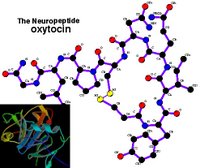 I'm fascinated by hormones and neurochemistry, especially oxytocin. Apparently, I'm not alone — check out Hug the Monkey, a blog about oxytocin.
I'm fascinated by hormones and neurochemistry, especially oxytocin. Apparently, I'm not alone — check out Hug the Monkey, a blog about oxytocin.Oxytocin is a hormone that acts as a neurotransmitter in the brain. It may be involved in bonding and the formation of trust between couples through release during orgasm in both sexes.
As someone who generally resists the idea of biology determining many things in my life, I have to say that I hate the fact that hormones rule so much about us, including our moods. But I found these thoughts on oxytocin as the hormone of bonding (and surrender) quite interesting:
Oxytocin is a hormone secreted by the hypothalamus at the based of the pituitary gland. Associated with the contractions of childbirth, the onset of lactation and the overall success of maternal bonding, oxytocin also seems to be necessary for all sorts of social bonding.It is part of the parasympathetic nervous system that moderates fight-or-flight impulses. It also reduces pain and makes us feel bonded to others. If there is a "surrender response," it may be greater in females; what UCLA psychologist Shelley Taylor calls "tend and befriend" behavior.
I don't know if anything at all has been written about the biochemistry of surrender. And I've spent a good bit of my professional life discounting biological explanations of social effects, but could it be that oxytocin is the hormone not only of bonding, but also of surrender? Could it be that there is an evolutionary value in having a lovely hormone that makes you loving and trusting when you haven't got even the remotest possibility of fighting or fleeing and quite urgently need the help of others?
In her book, "The Tending Instinct," Taylor explains that in stressful or dangerous situations, women are more likely to close ranks, gathering with other women and children to support each other, while men are more likely to jump up and fight to protect the family, clan or whatever. This is (simplistically) because men have higher levels of vasopressin -- the jump up and protect hormone -- and more testosterone, which mutes oxytocin. Women's higher levels of estrogen increase the calming, bonding effects of oxytocin.

Aucun commentaire:
Enregistrer un commentaire